SB 202
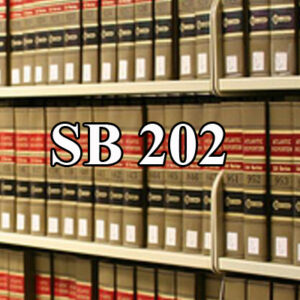 21 SB 202/AP
21 SB 202/AP
S. B. 202
– 1 –
Senate Bill 202
By: Senators Burns of the 23rd, Miller of the 49th, Dugan of the 30th, Ginn of the 47th,
Anderson of the 24th and others
AS PASSED
A BILL TO BE ENTITLED
AN ACT
To comprehensively revise elections and voting; to amend Chapter 2 of Title 21 of the1
Official Code of Georgia Annotated, relating to elections and primaries generally, so as to2
revise a definition; to provide for the establishment of a voter intimidation and illegal3
election activities hotline; to limit the ability of the State Election Board and the Secretary4
of State to enter into certain consent agreements, settlements, and consent orders; to provide5
that the Secretary of State shall be a nonvoting ex officio member of the State Election6
Board; to provide for the appointment, confirmation, term, and removal of the chairperson7
of the State Election Board;
CLICK HERE FOR THE ENTIRE BILL
Duties of the Secretary of State
Here is O.C.G.A. 45-13-20 – Notice the absence of language that defines the SOS’s role in Elections!
O.C.G.A. 45-13-20 (2010)
45-13-20. Duties of Secretary of State generally
The Secretary of State shall have the following duties:
(1) To keep the great seal of the state, which seal was adopted August 17, 1914, and is now on deposit in the office of the Secretary of State;
(2) To keep the original Acts passed by the General Assembly and all the public records of the state not appertaining especially to other offices; to look to and preserve the records and papers belonging to the Senate and the House of Representatives; and to see that the original journals of both houses are deposited and kept in his office;
(3) To attest all grants and other public documents issuing from the Governor and requiring the great seal of the state;
(4) To keep a record of all grants issued by the state;
(5) To keep safely all bonds of agents appointed to disburse public money;
(6) To furnish to all applicants, upon the payment of the prescribed fees, copies of all records and public documents within his office and to attach the great seal of the state to such transcripts as the Governor or General Assembly may direct;
(7) To destroy, quadrennially, all election returns of those officials whose terms of office have expired, which returns are on file in his office;
(8) To keep a book showing the dates when commissions were issued for all civil and military officers;
(9) To keep safely all the records of plats of land granted and to report the condition of such records to the Governor at least once a year;
(10) To keep in his office correct maps of all the different surveys (made by state authority), and maps of surveys comprising the land lotteries, showing their division into numbers, districts, sections, and the like, with a separate map for every district;
(11) To keep a register of the various grantees and the dates of the grants;
(12) To keep correct maps of all surveys of rivers, harbors, swamps, or land, which surveys were made by the special direction of the General Assembly;
(13) When necessary, to contract for the execution of new maps or the reexecution or repair of old maps, subject to the ratification of the General Assembly;
(14) To certify under his official seal, as the Comptroller General is directed to do;
(15) To print and distribute current maps describing the boundaries of congressional districts and the legislative districts of members of the Georgia Senate and House of Representatives; and
(16) To perform all other duties which are required of him by law or which necessarily attach to his office.
Statutory Requirements of Ballots
STATUTORY BALLOT REQUIREMENTS –
21-2-286. Printing specifications
(b) (3) Ballots printed by an electronic ballot marker shall be designed as prescribed by the Secretary of State to ensure ease of reading by electors, …
21-2-368. Review of manufacturer’s systems by Secretary of State;
(b) … system so examined can be safely and accurately used by electors …
(c) … system so reexamined can no longer be safely or accurately used by electors at primaries …
21-2-379.2. Review of manufacturer’s recording electronic voting system by Secretary of State;
(b) … system so examined can be safely and accurately used by electors …
(c) … system so reexamined can no longer be safely or accurately used by electors …
21-2-379.22. Requirements for electronic ballot marking.
No electronic ballot marker shall be adopted or used in primaries or elections in this state unless it shall, at the time, satisfy the following requirements:
(6) Produce a paper ballot which is marked with the elector’s choices in a format readable by the elector;
21-2-379.23. Requirements for ballot display; role of Secretary of State; (at a minimum)
(b) The form and arrangement of ballots marked and printed by an electronic ballot marker shall be prescribed by the Secretary of State.
(c) Notwithstanding any other law to the contrary, ballots marked and printed by an electronic ballot marker shall, at a minimum, contain:
(1) The words “OFFICIAL BALLOT”;
(2) The name and date of the election;
(3) The titles of the respective offices for which the elector is eligible to vote;
(4) Words identifying the proposed constitutional amendments or other questions for which the elector is eligible to vote;
(5) The name of the candidate and, for partisan offices, indication of the candidate’s political party or political body affiliation, or the answer to the proposed constitutional amendment or other question for which the elector intends to vote; and
(6) Clear indication that the elector has not marked a vote for any particular office, constitutional amendment, or other question.
21-2-379.24. Examination of electronic ballot markers;
(b) … the kind of device so examined can be safely and accurately used by electors …
(c) … a previously approved device appears to be no longer safe or accurate for use by electors …
Authorities and Prohibitions for Election Systems
O.C.G.A. § 21-2-300(a)(2). The statutory provisions mandate voting on “electronic ballot markers” that: (1) use “electronic technology to independently and privately mark a paper ballot at the direction of an elector, interpret ballot selections, communicate such interpretation for elector verification, and print an elector verifiable paper ballot;” and (2) “produce paper ballots which are marked with the elector’s choices in a format readable by the elector”
O.C.G.A. § 21-2-2(7.1); O.C.G.A.
21-2-281
O.C.G.A. 21-2-344 (2019 version) as that statute makes the election superintendent THE FINAL AUTHORITY (notwithstanding any other statute and it still does) to determine whether to use the Dominion system or paper ballots
21-2-379.22
O.C.G.A. 21-2-2(7.1) prohibited from having a “computing” function It is logically impossible for a BMD to take the elector’s input and translate that data into a graphic image in the nature of a “2D barcode” without a software routine or subroutine capable of making that computational translation into a printable graphic image which is placed on the face of a ballot.
Kemp v. Mitchell County Democrat Executive Committee, 216 Ga. 276, at 283 (1960) which states,
“It has long been the rule in this State that where there is no authority to hold the election, or where statutory requirements pertaining to the holding of an election are not complied with, the election is void, …”
That Honorable Court went on to say, citing precedent, that elections held in violation of mandatory statutes, in total disregard of the statutes, “…it can not be treated as an irregularity, but it must be held and adjudicated to be cause for declaring the election void and illegal.”
C.G.A. 21-2-366 (2010)
21-2-366. Authorization for utilization of optical scanning systems
The governing authority of any county or municipality may, at any regular meeting or at a special meeting called for the purpose, by a majority vote authorize and direct the use of optical scanning voting systems for recording and computing the vote at elections held in the county or municipality. If so authorized and directed, the governing authority shall purchase, lease, rent, or otherwise procure optical scanning voting systems conforming to the requirements of this part.
O.C.G.A. 21-2-334 (2010)
21-2-334. Voting by paper ballot when use of voting machine impossible or impracticable
If a method of nomination or election for any candidate or office, or of voting on any question is prescribed by law, in which the use of voting machines is not possible or practicable, or in case, at any primary or election, the number of candidates seeking nomination or nominated for any office renders the use of voting machines for such office at such primary or election impracticable, or if, for any other reason, at any primary or election the use of voting machines wholly or in part is not practicable, the superintendent may arrange to have the voting for such candidates or offices or for such questions conducted by paper ballots. In such cases, paper ballots shall be printed for such candidates, offices, or questions, and the primary or election shall be conducted by the poll officers, and the ballots shall be counted and return thereof made in the manner required by law for such nominations, offices, or questions, insofar as paper ballots are used.
An Opinion Regarding the Use of the Dominion Voting System
“Ms. Davis emailed a question,
Why is it our state election board will not authorize emergency hand marked ballots?
Because Ms. Davis, they don’t have to, nor do they believe their Paramount duty requires them to judicially challenge a void contract to protect the people of this State. They prefer, for a politically expedient view, to assume that Raffensperger would not enter into a void contract.
The Law, O.C.G.A. 21-2-334 clearly gives the “election superintendent”, whether that be an individual or a local Board of Elections, the authority to make the decision, “for any other reason”, to authorize the use of paper ballots for in-person hand-marking at any election. Of course, if Raffensperger continues his threats to lower election officials, that won’t be a worry.
You see, the original contract which brought us the “Dominion Solution”, signed by the parties on July 29 and August 12, 2019, is void, both as a matter of law and of fact. That is due to the provision of the attached Exhibit B, par. 3.1, with which both parties agreed, that Dominion would provide an illegal piece of equipment which would produce an illegally formatted piece of paper, defined as a Ballot (clear violation of O.C.G.A. 21-2-2 (7.1)). Of that written fact, Raffensperger was aware, yet accepted it, providing his certification of illegal conduct, even though he knew or reasonably should have known of the illegal piece of equipment (the BMD) and its illegal result.
This, as a matter of law, resulted in an intentional FRAUD being perpetrated upon all the legal voters of Georgia which has been continuing over the last 5 elections, all of which are void (Kemp v. Mitchell Co. Dem. Ex. Com., 216 Ga. 276, 282-283 (1960)), with the collusion of multiple co-conspirators, including the U.S. Election Assistance Commission, the State Elections Board, Governor, Attorney General, Speaker of the Ga. House, the President of the Ga. Senate, various judges in this State, at least one Federal Judge, the GBI, not to mention a multitude of lawyers including the USDOJ, aided and abetted by the indifference to their ignorance of the Sheriffs and the Grand Juries of this State and, least we offend by a failure to mention, the FBI, the 46th, the US Congress, and the leadership of the Georgia Republican and Democrat Parties.
“Georgia’s Election Code mandates the use of the BMD system as the uniform mode of voting for all in-person voters in federal and statewide elections. O.C.G.A. § 21-2-300(a)(2). (Statement correct but does not notice stipulation of “as soon as possible” and “certified by SoS as safe and practicable for use”. A “safe and practicable for use” certification was, at the very least, a gross abuse of the SOS’s discretion!)
The statutory provisions mandate voting on “electronic ballot markers” that: (1) use “electronic technology to independently and privately mark a paper ballot at the direction of an elector, interpret ballot selections, communicate such interpretation for elector verification, and print an elector verifiable paper ballot;” and (2) “produce paper ballots which are marked with the elector’s choices in a format readable by the elector” (7.1) “Electronic ballot marker” means an electronic device that does not compute or retain votes; may integrate components such as a ballot scanner, printer, touch screen monitor, audio output, and a navigational keypad; and uses electronic technology to independently and privately mark a paper ballot at the direction of an elector, interpret ballot selections, communicate such interpretation for elector verification, and print an elector verifiable paper ballot. O.C.G.A. § 21-2-2(7.1); O.C.G.A. § 21-2-300(a)(2). (Statement legally correct as a statement of legislative intent at that time.)
Plaintiffs and other voters who wish to vote in-person are required to vote on a system that does none of those things. Rather, the evidence shows that the Dominion BMD system does not produce a voter-verifiable paper ballot or a paper ballot marked with the voter’s choices in a format readable by the voter because the votes are tabulated solely from the unreadable QR code.
(Statement partially correct … it is only partially readable and totally unverifiable upon being “canvassed”.)
Thus, under Georgia’s mandatory voting system for “voting at the polls voters must cast a BMD generated ballot tabulated using a computer generated barcode that has the potential to contain information regarding their voter choices that does not match what they enter on the BMD (as reflected in the written text summary), or could cause a precinct scanner to improperly tabulate their votes.”
(Assessment legally correct)
With that language, could it indeed be argued that the output of the BMD does not meet the legal definition of a ballot and therefore are not qualified under the law to be withheld from the public? Is this not a fraud?
(Supposition legally correct as a conclusion of fact and the laws as to the conduct of the Legislators who passed these laws and the Governor who signed them (committing fraud upon the citizens) … except for one old statute, O.C.G.A. 21-2-344, enacted in 1964 and amended in 1998.)
It appears that Justice Totenberg was not made aware of O.C.G.A. 21-2-344 (2019 version) as that statute makes the election superintendent THE FINAL AUTHORITY (notwithstanding any other statute and it still does) to determine whether to use the Dominion system or paper ballots. It does not take a rocket scientist to understand that if the BMD places a mark upon a ballot that is not discernible by a voter, then the resulting printed paper product does not comply with O.C.G.A. 21-2-300, and it is, therefore, an illegal and unconstitutional product which provides the superintendent (under -344) the “any other reason” to require paper ballots! The addition of that QR code is what makes the fraud and the entire Dominion System illegal!
These statutes create a conflict of law, and the only statutory authority to resolve the conflict is the Superintendent of Elections at the county level and/or the presentment of the local Grand Jury directed to the Election Superintendent! AND, if any Board of Elections, or a member thereof, or the Election Superintendent is threatened with civil or criminal action for not using the Dominion System (and some were), they will have a criminal action to punish for the threat being made.
Now, take her statement and the statutes to those clothed with the constitutional authority to be “Judges of The Law” and ask them to judge! Now is the time for one Grand Jury to stand up and Order the 2020 election, the 2021 primary illegally obtained, void as a matter of law, and order the Governor to issue his warrant for election do-overs!
SB 202 Federal Court Opinion
The Coalytion for Good Governance cha;;enged several provisions of SB 202. The opinion of Judge Boulee is very interesting reading. Of particular interest, as in the Curling V Raffensperger case are the refutations of the arguments proffered by the State’s counsel for the defense. Judge Boulee covers many of the cases cited by the State’s attorneys and, in essence, calls them out for irrelevance much as Judge Totenberg did in Curling v Raffensperger.

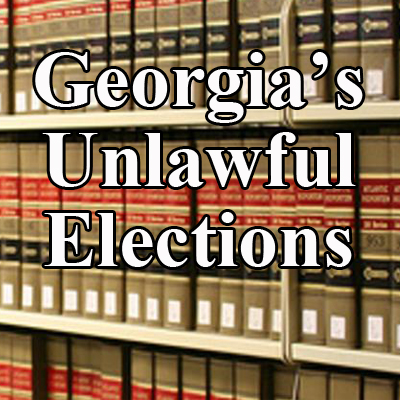
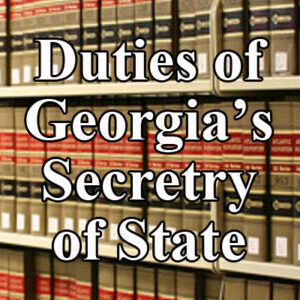
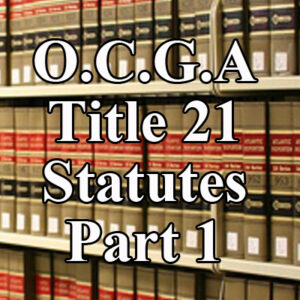
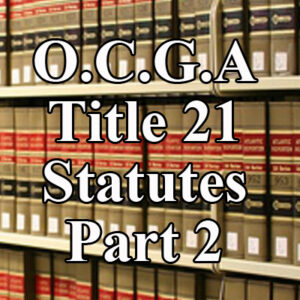
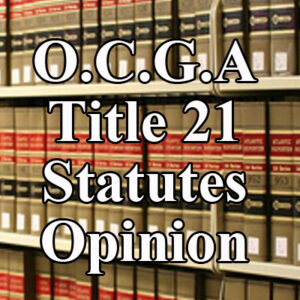
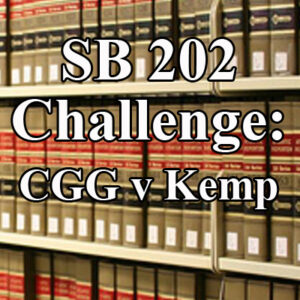
Recent Comments